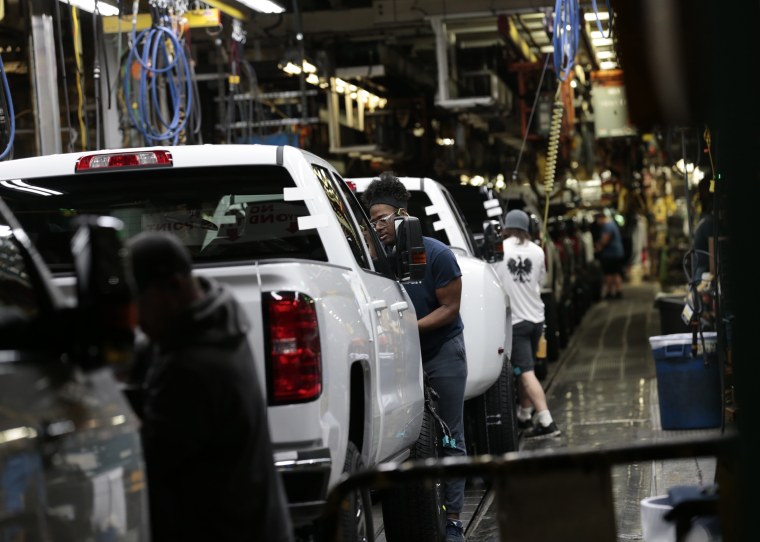As Donald Trump's event in central Michigan began last night, the first words out of the president's mouth were, "We brought you a lot of car plants, Michigan. We brought you a lot of car plants. You know that, right?" The Republican added soon after, "You better vote for me; I got you so many damn car plants."
The Detroit Free Press took a closer look at reality.
President Donald Trump made wildly inaccurate claims at a rally outside Saginaw on Thursday night, suggesting he has revitalized auto manufacturing in the state when it actually lost jobs even before coronavirus hit in March.... As of February, there were about 2,400 fewer auto and auto parts jobs in Michigan than when Trump took office in January 2017.
At one point during his strange speech last night, the president described the details of a conversation he had with Japanese Prime Minister Shinzo Abe, whom Trump said he told to "give us plants." His counterpart in Tokyo resisted, but in the story, the Republican insisted. "The next day," Trump boasted, "they announced five car companies are coming to Michigan."
The crowd cheered in approval, unaware of the fact that no such Japanese announcement was made, and five car companies did not "come to Michigan." (Last year, Toyota announced new investments in some U.S. plants -- none of which are in Michigan -- but the news did not include the construction of any new plants.)
What's more, if last night's brazen lying seemed familiar, it wasn't your imagination. In Labor Day remarks earlier this week, the president told reporters, "By the way, many plants are being built right now -- auto plants -- in Michigan, just like I said. They're being built in Ohio; they're being built in South Carolina, North Carolina. They're being built all over and expanded at a level that we've never seen before, because I said to Japan and Germany and others: 'Sorry, you got to come here and build plants. Otherwise, we're going to have to make it very tough on you with tariffs.'"
All of this sounded quite impressive, right up until the Washington Post examined the boasts in more detail. The newspaper found that there have been no new plants built in Ohio, North Carolina, or South Carolina in the Trump era; investments in auto manufacturing actually slowed after Trump took office as compared to a comparable period from Barack Obama's second term; and "there's no evidence that Trump's threat of tariffs led to more auto investment."
I have no idea whether the president believes his own nonsense. It's possible that he realizes none of these claims is true, but he's hoping to fool just enough for voters to help him stay in power.
But it would also be consistent with Trump's style if he convinced himself that his falsehoods were factual. He likes the idea of new plants, so he tells the public that the imagined new plants exist, and he starts to believe that the non-existent new plants are actually there.
In Bob Woodward's new book, former Director of National Intelligence Dan Coats reportedly told former Defense Secretary James Mattis, in reference to Trump, "To him, a lie is not a lie. It’s just what he thinks. He doesn’t know the difference between the truth and a lie."
Whether the president appreciates the difference between fiction and reality or not, there's no reason for the public to be fooled by such absurdities.
Postscript: For what it's worth, lying about auto manufacturing appears to be a go-to move for Republicans who are behind in the polls. It was late October 2012 when Mitt Romney's campaign, fearful of losing Ohio, suggested Chrysler was poised to move Jeep production from Ohio to China. It was a lie, but when confronted with the truth the candidate doubled and tripled down on the falsehood, even as auto industry executives called him out for deceiving the public.
The New York Times editorialized at the time, "It's bad enough to be wrong on the policy. It takes an especially dishonest candidate to simply turn up the volume on a lie and keep repeating it." What's more, the Toledo Blade chastised Romney for "conducting an exercise in deception about auto-industry issues that is remarkable even by the standards of his campaign."
Romney soon after lost Ohio -- and the election.
